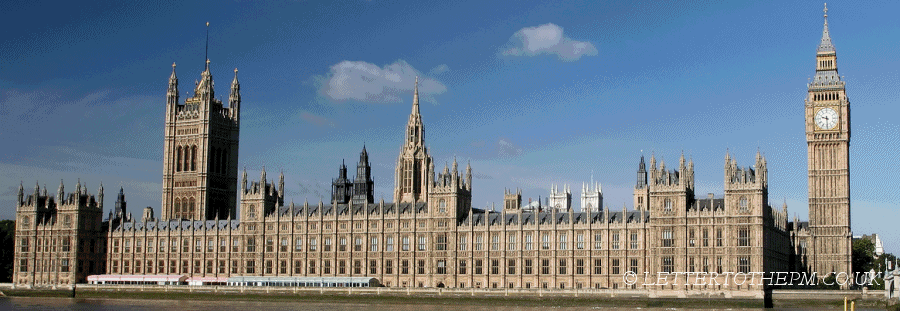
The Prime Minister
10 Downing Street
London
SW1A 2AA
100 Any Road
Typical Town
County
England
15th April 2016
The real cost of EU
membership to
Sovereignty
Like other citizens I have
received by post the leaflet or should I say pamphlet “Why
the Government believes that voting to remain in the European Union is
the best decision for the
Laws that are made by the British government can be
repealed by a new government or amended but we are stuck with EU laws,
there appears to be very little we can do to amend or reject laws that
come from the EU. Consider this quote from a BBC article from Michael
Gove the Conservative Justice Minister: Michael Gove, who
also wants to leave the EU, explained at the weekend what he saw as the
consequences of EU membership.
“Michael Gove argues the EU limits the
He said the
This loss of sovereignty can be expressed by the popular
expression “We want our country back” This is serious. It could bring
down a government.
Economic cost
This document provides government information not available to the pamphlet mentioned above even via the source information: http://researchbriefings.parliament.uk/ResearchBriefing/Summary/SN06091#fullreport
“Various studies have attempted to quantify the benefit or cost
to the
Since our GDP 2014 latest available is USD 2,988,893,283,565
almost 3 trillion USD if we apply a rate of 3 percent of GDP the cost of
membership of the EU is 89 billion USD or nearly 64 billion GBP. Even if
the cost of membership of the EU was only 1 percent of GDP the cost
would be £21 billion pounds. Never mind £55 million a day! We are
talking billions of pounds.
Can you explain why this sacrifice of funds and sovereignty is really desirable?
Yours sincerely A. Citizen
A reply to the above letter is published below

lO
From The Direct Communications Unit 6 May 2016
Dear Citizen
I am writing on behalf of the Prime Minister to thank you for your recent letter.
Mr Cameron is grateful for the time and trouble you have taken to get in touch.
Because the Foreign and Commonwealth Office is best placed to respond to the matters you raise, he has asked me to forward your letter to the Department so that they may reply to your concerns directly.
Yours sincerely
A reply from the Foreign & Commonwealth Office is published below
Correspondence
Officer
Foreign &
Commonwealth Office
Foreign & Commonwealth
Office,
King Charles Street,
London,
SW1A2AH
10th June 2016
Ref: MOP/97399/2016
Dear Citizen
Thank you for your letter of 15 April to the Prime Minister about the European Union. Where relevant, letters are delegated to officials at the appropriate department for a response. Therefore your letter has been forwarded to the Referendum Unit of the Foreign & Commonwealth Office as the department leading on this issue.
Thank you for the points you raise on the Government's EU referendum leaflet on the issues of sovereignty and economic cost.
At the February European
Council the Government negotiated a new settlement for the
The Government has also published papers which examine the economic aspects of the choice facing the British people. These include:
- "HM Treasury analysis: the long-term economic impact of EU membership and the alternatives", published on 18 April.
- "HM Treasury analysis: the immediate economic impact of leaving the EU", published on 23rd May. [Cm 9250]
Both papers can be found on gov.uk.
Yours sincerely,
A reply to the above letter from Foreign & Commonwealth Office is published below
Sovereignty
"When European leaders declare it “legally binding”, they mean it’s legally binding under international law, not EU law.
Under international law, it's “irreversible” in the sense that the UK government would have to consent before it could be amended or repealed.
The Decision will not as such change EU law, although other elements of the overall deal would: the planned legislation on free movement issues, and the promised decision on eurozone issues.
Indeed, the Decision couldn’t change EU law without following the formal procedures to do so. It explicitly recognises that it can’t have that effect.
This part of the deal can’t be directly enforced in the EU court, but can’t be attacked there either
The Decision can include legal obligations for EU members as a matter of international law, as long as this doesn’t conflict with EU law.
In the event of any conflict, the primacy of EU law means that it takes precedence over the Decision.
The distinction between the Decision and EU law does mean that there is a gap in the Decision’s enforceability.
A dispute about enforcing it can be brought back before the European Council. But there is nothing on bringing a dispute before the EU court, which could then impose fines.
So despite the binding nature of the Decision, there isn't a clear mechanism for making it stick.
On the other hand, because the Decision isn’t part of EU law, another country couldn’t directly challenge it before the EU court either.
Other parts of the deal changing EU law itself could be legally challenged or blocked by politicians"
Economic cost
The reply from the Foreign & Commonwealth Office doe not mention my calculations which are based on the quantities referred to in the Summary to the government briefing paper. That document has been updated a few days ago (13th Jun 2016) In the updated paper mention of possible rates of cost of membership to the EU, other than just our subscription has been removed. A copy of the original paper renamed can be downloaded: eu uk trade SN06091
From the original paper: "
Various studies have attempted to quantify the benefit or cost to the UK of its membership of the EU. This is a very difficult exercise and depends on a wide range of assumptions. Estimates vary significantly. For example, a 2005 study by the Institute for Economic Affairs found a cost of between 3% and 4% of GDP while a 2013 study by the CBI found a net benefit of between 4% and 5% of GDP. A 2015 study by Open Europe found that the cost of the 100 most burdensome EU regulations was £33.3 billion a year." At least these various estimations of the cost or benefit of being a member of the EU can be entered into a calculator whereas the Treasury analysis 201 page document doesn not make any attempt to consider leaving in positive terms. This is unrealistic. In fact what George Osborne has done is instruct the Treasury to remove all reference to the estimations made by the Institute of Economic Affairs, a study made by the CBI and Open Europe
Assuming that we have some figures to go on the next problem is calculating even simple percentages when dealing with numbers that are in the trillions.. An Excel spreadsheet has been created to manage this problem. Percentage Calculator